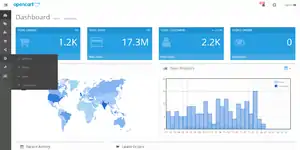OpenCart
OpenCart is an online store management system. It is PHP-based, using a MySQL database and HTML components. Support is provided for different languages and currencies. It is freely available under the GNU General Public License. As of May 2016, 342,000 websites were using OpenCart.
 | |
 | |
| Developer(s) | OpenCart Ltd. |
|---|---|
| Initial release | April 2010 |
| Stable release | |
| Repository | OpenCart Repository |
| Written in | PHP |
| Operating system | Cross-platform |
| Type | Shopping cart software |
| License | GNU General Public License |
| Website | www |
History
OpenCart was originally developed in 1998 by Christopher G. Mann for Walnut Creek CDROM and later The FreeBSD Mall.[2][3] The first public release was on the May 11, 1999. Developed in Perl, the project saw little activity, and progress stalled in 2000, with Mann posting a message on April 11 stating "other commitments are keeping me from OpenCart development".
The domain expired in February 2005 before being revived by Daniel Kerr, a UK-based developer, who used it as the basis for his own e-commerce software, written in PHP. The first stable release was version 1.1.1, released onto Google Code on 10 February 2009.
In September 2014, Kerr claimed that OpenCart was the number one e-commerce software supplier in China [4] while in August 2015 it was recorded as responsible for 6.42% of the global e-commerce volumes recorded by builtwith.com, behind WooCommerce and Magento and ahead of OSCommerce, ZenCart and Shopify.[5] In February 2017, he stated that OpenCart had about 317,000 live OpenCart sites, which was, according to Kerr, more than Shopify or Magento.[6]
Version 2.0 of the software was released in October 2014, featuring an extensive update of the interface.[7][8]
Version 2.2.0.0 of the software was released in March 2016, after months of testing from OpenCart users.[9][10]
OpenCart uses fraud management services such as FraudLabs, ClearSale and Global Payments to review customer orders.[11][12][13]
Publications
- Yilmaz, Murat (August 2010). OpenCart 1.4: Beginner's Guide. Packt Publishing. p. 240. ISBN 9781849513029.
- Hasan, Tahsin (March 2011). OpenCart 1.4 Template Design Cookbook. Packt Publishing. p. 328. ISBN 9781849514309. Archived from the original on 2014-08-02. Retrieved 2015-11-19.
- Watson, Kerry R (March 2012). ShowMe Guides OpenCart 1.5 User Manual. CreateSpace Independent Publishing Platform. p. 352. ISBN 978-1468142365.
- Mihail Savov (August 2016). The Definitive Guide to Getting Started with OpenCart 2.x For Beginners. iSenseLabs. p. 140. ISBN 978-0-9966004-5-3.
- iSenseLabs (2015). OpenCart 2.0 Tips and Tricks #2. iSenseLabs. p. 118. ISBN 978-0-9966004-1-5.
See also
References
- "Releases - opencart/opencart". github.com. Retrieved 8 December 2020.
- "OpenCart". Christopher G. Mann. Archived from the original on 22 October 1999. Retrieved 12 August 2015.
- Mann, Christopher G. (19 March 1999). "Suggestion, Linux ldconfig /etc/defaults/rc.conf". MavEtJu.org. Retrieved 12 August 2015.
- Wong Yat Hei (30 September 2014). "A Business Mind: Daniel Kerr, founder of OpenCart". South China Morning Post. Retrieved 12 August 2015.
- "Global eCommerce Technology Distribution". builtwith.com. 12 August 2015. Retrieved 12 August 2015.
- "OpenCart – Your Own Complete, Stand-Alone eCommerce and Shopping Cart Platform. | HostAdvice". HostAdvice. Retrieved 2017-07-24.
- Kaya Ismail (3 October 2014). "OpenCart 2.0 Released". cmscritic.com. Archived from the original on 30 August 2018. Retrieved 12 August 2015.
- Paul Feakins (31 October 2014). "A Quick Look at OpenCart 2.0". antropy.co.uk. Retrieved 14 December 2015.
- Vedi Badiyan: Opencart Developers (9 April 2019). "OpenCart v3.0.3.2 Released". kuberthemes.com.
- Vedi (2 March 2016). "A Quick Look at OpenCart 2.2.0.0". foodcod. Archived from the original on 4 June 2016. Alt URL
- "ClearSale - Global Pioneer and Proven Leader in Fraud Protection Solutions".
- "Set Up Fraud Detection Using the FraudLabs Pro Library in OpenCart".
- "A Guide to Major Opencart Updates in 2015".